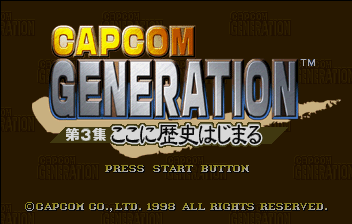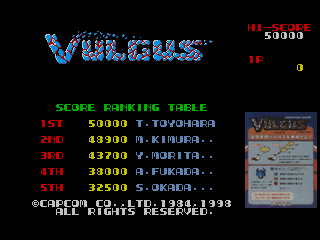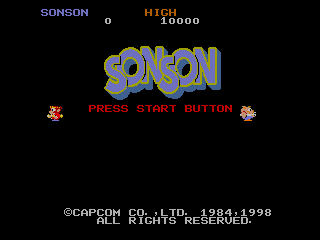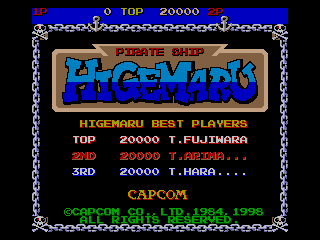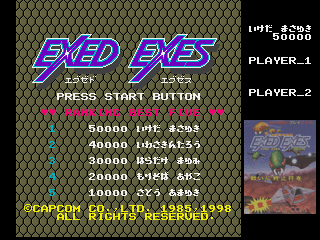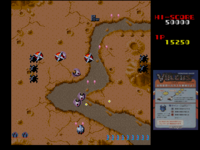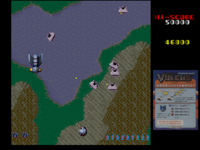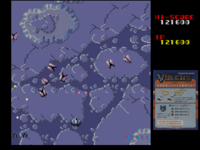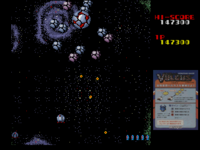Capcom Generation: Dai 3 Shuu Koko ni Rekishi Hajimaru
From Sega Retro
| ||||||||||
| Capcom Generation: Dai 3 Shuu Koko ni Rekishi Hajimaru | ||||||||||
|---|---|---|---|---|---|---|---|---|---|---|
| System(s): Sega Saturn | ||||||||||
| Publisher: Capcom | ||||||||||
| Developer: Capcom | ||||||||||
| Original system(s): all four games ran on their own unique arcade boards | ||||||||||
| Game total: 4 | ||||||||||
| Sound driver: SCSP/CD-DA (65 tracks) | ||||||||||
| Peripherals supported: 6Player | ||||||||||
| Genre: Compilation, Variety (バラエティ)[1], Table[2] | ||||||||||
| Number of players: 1-2 | ||||||||||
| ||||||||||
|
Capcom Generation: Dai 3 Shuu Koko ni Rekishi Hajimaru (カプコンジェネレーション第3集 ここに歴史はじまる, "History Begins Here") is the third of five compilations for the Sega Saturn (and PlayStation) developed by Capcom.
The third volume features four of the first five video games developed by Capcom (the missing game, 1942, was previously included in Capcom Generation: Dai 1 Shuu Gekitsuiou no Jidai).
Contents
Games included
- Vulgus
- Son Son
- Pirate Ship Higemaru
- Exed Exes
Every game has a "Collection" with artwork (including promotional art and concept art), information, and game tips. Options and high scores can be saved to the Saturn's internal memory.
Gameplay
Vulgus
Vulgus is the first video game created by Capcom, originally released in 1984. It is a vertically scrolling shoot-'em-up, similar to rival Namco's 1982 hit Xevious. The player controls a spaceship and must destroy endless waves of incoming enemies. The game does not have distinct levels; the background alternates between the surface of a planet and a space field. The Vulgus, a molten rock, is the boss of the game. Once it is destroyed, the game loops from the beginning of the level with increased difficulty until the player loses or decides to stop playing. There is an alternating two-player mode.
The spaceship moves in any direction using the D-Pad. Its primary weapon, two parallel shots, can be fired with ![]() or
or ![]() . There are two rapid-fire buttons that shoot faster,
. There are two rapid-fire buttons that shoot faster, ![]() (low speed) or
(low speed) or ![]() (high speed). It has a secondary supply of missiles that can be fired straight ahead with
(high speed). It has a secondary supply of missiles that can be fired straight ahead with ![]() . The missiles can penetrate through multiple targets in a line or instantly eradicate a single large enemy that normally takes multiple shots to destroy. The primary weapon is unlimited; the missiles are limited, but the player can acquire more by picking up "POW" items. Bonus points are awarded for destroying every enemy in a formation or for destroying multiple enemies with a single missile.
. The missiles can penetrate through multiple targets in a line or instantly eradicate a single large enemy that normally takes multiple shots to destroy. The primary weapon is unlimited; the missiles are limited, but the player can acquire more by picking up "POW" items. Bonus points are awarded for destroying every enemy in a formation or for destroying multiple enemies with a single missile.
The spaceship is destroyed in a single hit from an enemy, but it respawns at a predetermined checkpoint if the player has extra lives left. The game ends if the player runs out of lives. Extends are given at 20,000 points, then every 40,000 points after that.
The player can change the number of starting lives (between 1 and 5). Since the original game uses a vertical aspect ratio, there are three screen modes: Type 1 interpolates the image to fit into the height of the Saturn's video mode, Type 2 (the default) crops the playfield to fit the screen, and Type 3 preserves the vertical aspect ratio (but requires the player to rotate the monitor).
Items
Three of the items are detrimental to the player and increase the difficulty of the game.
| POW | |
|---|---|
| Restocks the player with another missile (up to a maximum of 15). | |
| S | |
| Increases the movement speed of enemies. | |
| E | |
| Increases the attack speed of enemies. | |
| D | |
| Increases the number of enemies. | |
| Sakichi (佐吉) | |
| Awards 10,000 bonus points. This item only appears if the player has previously collected the S, E, and D items. |
Son Son
Pirate Ship Higemaru
Exed Exes
History
Release
This is the first release in the Capcom Generation series. The Sega Saturn versions of these games were exclusively released in Japan, but the PlayStation versions of the first four volumes were also released in Europe as part of a bundle titled Capcom Generations (except for the German version, which omits the fourth volume).
Magazine articles
Promotional material
Physical scans
| Sega Retro Average | ||||||||||||||||||||||||
|---|---|---|---|---|---|---|---|---|---|---|---|---|---|---|---|---|---|---|---|---|---|---|---|---|
|
| 62 | |
|---|---|
| Based on 4 reviews | |
Technical information
References
- ↑ File:CapcomGeneration3 Saturn JP Box Back.jpg
- ↑ 2.0 2.1 https://sega.jp/history/hard/segasaturn/software_l.html#tab04 (Wayback Machine: 2019-12-07 02:59)
- ↑ Sega Saturn Magazine, "1998-30 (1998-10-23)" (JP; 1998-10-09), page 5
- ↑ Famitsu, "1998-10-23" (JP; 1998-10-09), page 1
- ↑ Saturn Fan, "1998 No. 19" (JP; 1998-10-02), page 152
- ↑ Sega Saturn Magazine, "1998-30 (1998-10-23)" (JP; 1998-10-09), page 177
- ↑ Sega Saturn Magazine, "Readers rating final data" (JP; 2000-03), page 14
| Capcom Generation: Dai 3 Shuu Koko ni Rekishi Hajimaru | |
|---|---|
|
Main page | Comparisons | Magazine articles | Reception | Technical information
| |
